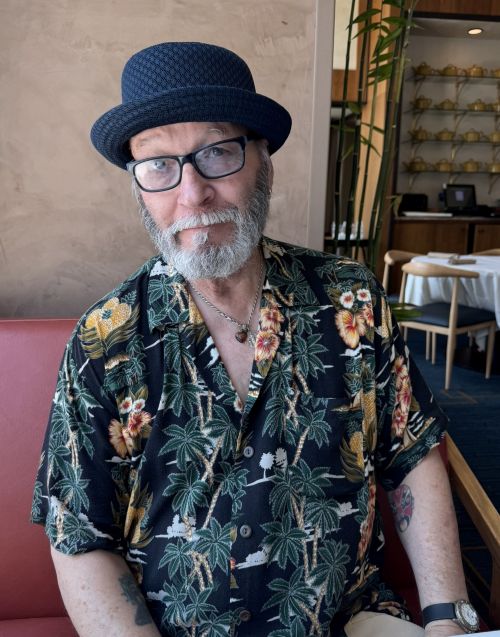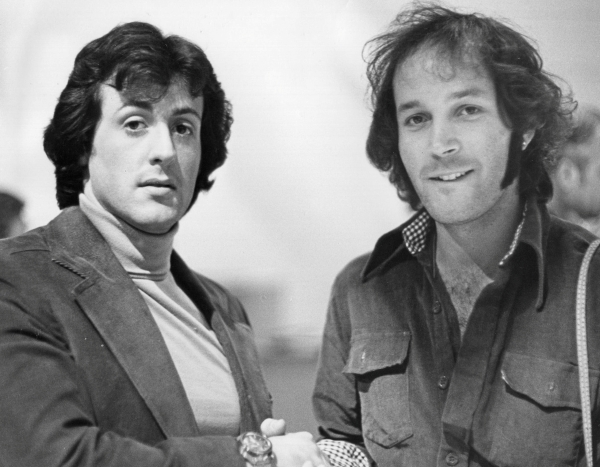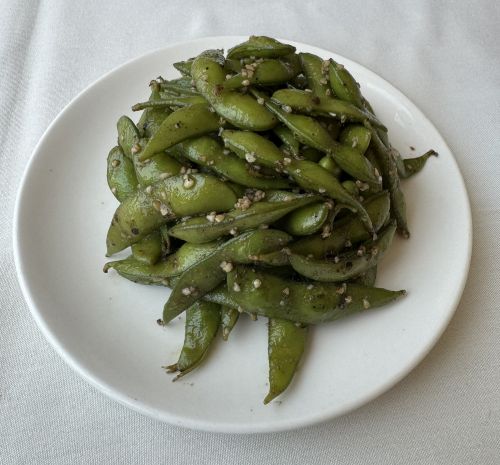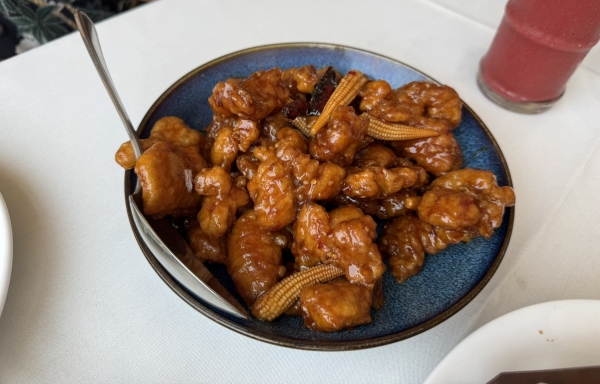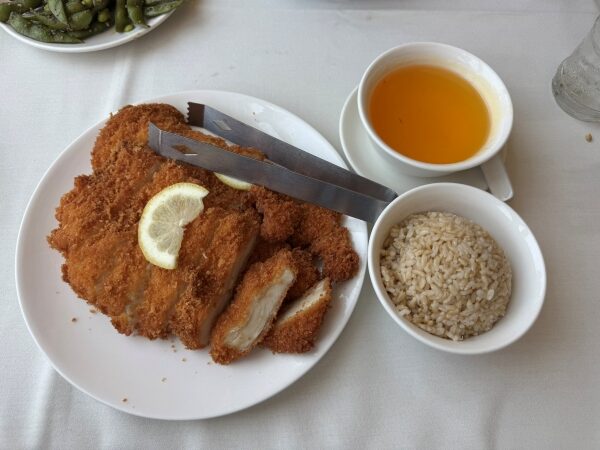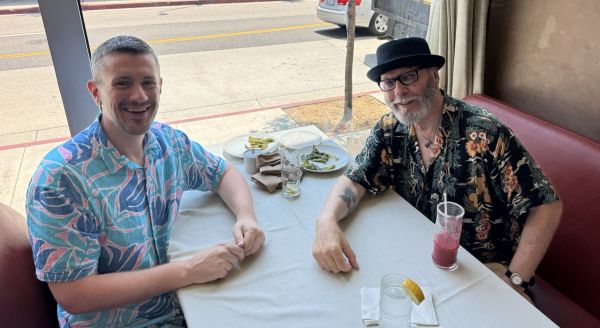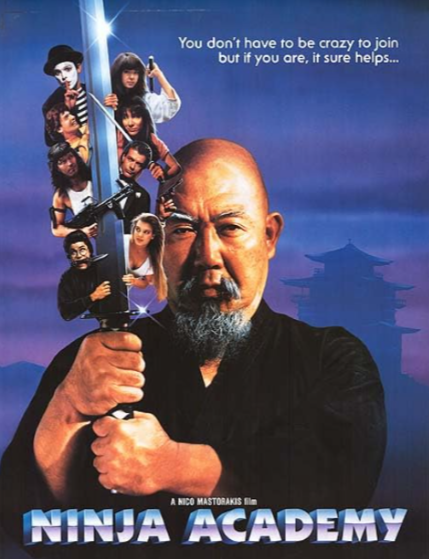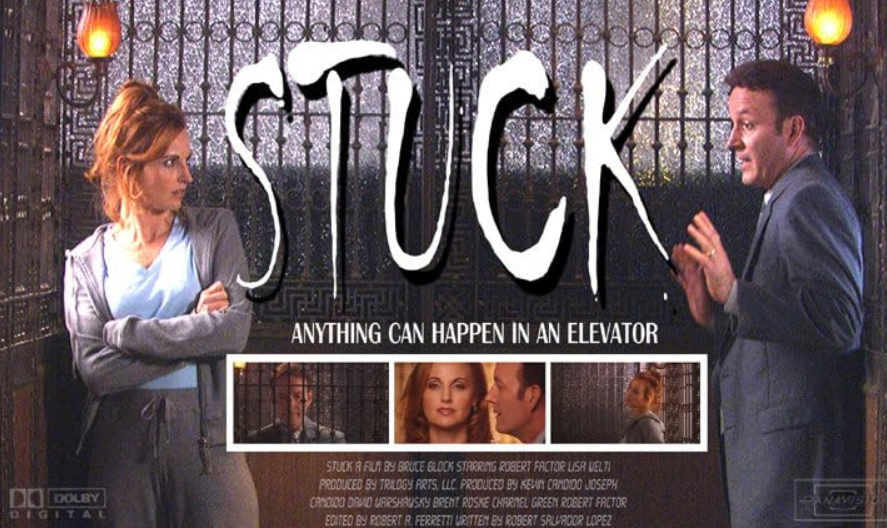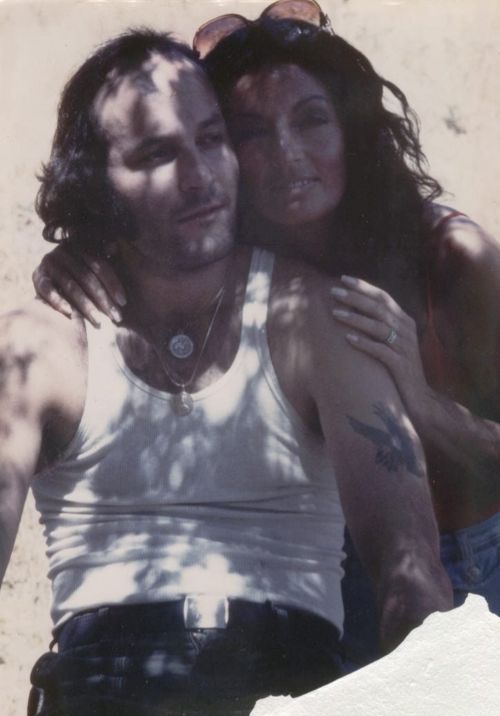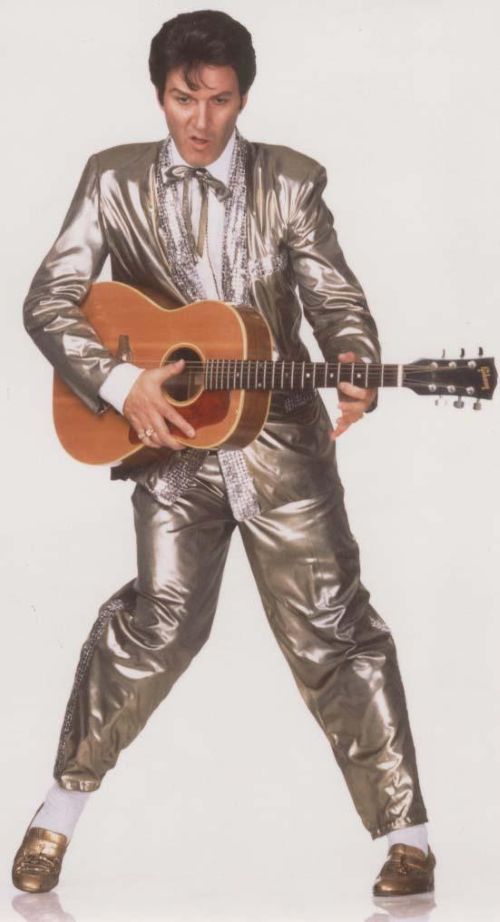GLENDALE, CALIFORNIA
July 17, 2025
STRANGER: Robert Factor
LOCATION: Panda Inn, 201 N Maryland Ave, Glendale, California
THEME: A cult film star and theater veteran on a life chasing roles, stories and surprises
“I’m a great talker,” Robert Factor said when I invited him to lunch. “People love my stories.”
What an understatement.
After nearly 100 plays, many short films, and a life more dramatic than some screenplays, the actor isn’t chasing stardom. But he’s stepping into a different kind of spotlight: his own story.
We meet at Panda Inn in Glendale, California, where he opens up about everything: grief, reinvention, juvenile detention, cult film sets, decades at NBC, stage triumphs, and more. Friends keep urging him to write a memoir. For now, he’s sharing his tales across the table, speaking with candor, and the timing of a seasoned storyteller.
Warm from the second we meet, Robert projects a relaxed confidence, an assurance that easily disarms me and allows for a casual flow to our conversation. It feels more like two old friends catching up – even if one first saw Robert in Ninja Academy at age 10, thanks to his mum letting him rent the R-rated movie on VHS back in 1990.
Dressed in a Hawaiian-style shirt, he sports a well-maintained salt-and-pepper beard. His kind eyes are framed by thick black glasses, the look topped off with a navy pork pie hat and an elegant wristwatch. A necklace peeking from beneath his collar and colorful tattoos on his forearms hint at a rebellious streak. And he had one once.
Because he didn’t always want to be an actor. He wanted to be a gangster.
Born Robert Salvador Lopez – “I’m a Spanish-Mexican Jew,” he says with a wry smile – he grew up in LA. His IMDB listing coyly describes how, before getting into acting, he spent “much of his teenage years taking unwanted vacations in undesirable locales.”
“Juvenile hall and a boy’s home,” he explains, telling me his dad spent time in the notorious San Quentin prison and a brother in Folsom. Robert was one of six kids being raised by their mother and stepfather beginning in South Central Los Angeles.
The tough childhood had impacts felt to this day. “I come from a family of heroin addicts. My brother ended in a foster home which just destroyed him. I have two brothers right now that are on methadone. But I forgive my mom, she was a kid trying to raise kids.”
Despite the challenges growing up and his own tussles with the law, when Robert was 19 his life pivoted following the birth of his baby sister. “I looked at her and realized I gotta be there for her”, after her father died of an over-dose. “No-one was there for me.”
Determined to find a stable career, he was talking with a friend who said Robert was a funny guy and should be in the movies. “I had all the encyclopedias on Al Capone and John Dillinger and Bonnie and Clyde. I remembered those and then the movies about them, and I love movies, so I decided to see if I had any potential.”
His start was at Valley College, a junior college, where he took a class in voice and diction; the acting class was full. Regardless, the newcomer stood out. “Back then I was a low-rider, a greaser, I had the pompadour, wore all back – I probably looked like a young Johnny Cash,” he says, then adds with a wink, “But better looking.”
Robert recalls how he didn’t know what the teacher meant when they told students to memorize a sonnet for the final exam. “So, I went up to this pretty girl who I had a kind of a crush on and I said, ‘Excuse me, what are sonnets?’ And she said, ‘Poetry.’”
He was the last one to perform, and vividly recalls feeling judgment from the other guys in the class. He’d prepared to recite the lyrics to “The Ballad of Bonnie and Clyde,” by Georgie Fame, but blanked once on the stage. Scrambling for a solution, he asked the audience to bow their heads and spoke the Lord’s prayer instead. “And because I enunciated so well, everyone applauded and cheered, I got an A.”
From that first round of applause, he never looked back.
In his last year of college he’d done three plays, including Harold Pinter’s The Birthday Party and Dracula. In the latter, he played the count’s bug-eating unhinged servant Renfield. “I guess you could say I went kind of method, because I actually tasted a fly.”
Today, mercifully, we’re tasting something much more appetizing: a small but delectable plate of wok-fried edamame in garlic sauce. It’s savory, salty, and slightly addictive. We both keep picking at it as Robert continues.
Robert made a decision to leave college without graduating. He’d won a best supporting actor award and felt it was time to move on and pursue theatre in L.A. He wanted to continue studying acting but didn’t know whether to apply for tutelage under Lee Strasberg or Stella Adler.
Explaining why he decided that pursuing a lifetime of performing was a good fit, he says, “I love a live audience, I love the comedy and just the reactions, and I think going back, probably because I never got the attention as a kid. That’s probably why.
A lifelong fan of actor Marlon Brando (who ended up studying under Stella Adler), he first went to see what the Strasberg classes were like. What he saw did not win him over, as he remembers watching two people sitting at a dinner table eating in silence, trying to do method for over 10 minutes. “That’s not for me,” he says, “Then I later found out Brando never studied with Strasberg, he just went there to pick up girls.”
Just then, our food arrives.
Robert’s orange chicken comes piled high and glossy, while my lemon chicken has the glaze on the side. The portions are enormous, and I’m all ears as I urge Robert – between bites – to pick up the thread of his acting class days.
Adler’s class was a much better fit, and he name-checks notable classmates who would go on to thrive in television and film like Bruno Kirby and Bruno’s then-girlfriend Annette O’Toole. Even did an exercise with Harvey Keitel.
He studied there for four years, and it’s where he learned to go out on a limb and pursue roles far removed from his troubled youth. Starting out in acting, Robert had defaulted to characters with elements from his past – perhaps on the wrong side of the law, hardened and not the kind you’d want to pick a fight with. He even once played Charlie Manson on stage in Hollywood.
So, it was only natural to Robert to do a scene as a hoodlum role in the play The Indian Wants the Bronx. “And the character, he yells ‘pussy face!’ at his social worker. So, I’m up on stage, I’m yelling ‘pussy face!’ at the top of my lungs, we’re halfway through the scene and Stella stops it. And I’m thinking, what? I could tell the audience was loving it.”
His teacher not so much. Adler told him that playing these tough guys parts was too easy, that Robert was picking familiar roles instead of challenging ones.
Taking the advice to heart, Robert cut his hair, got his first suit and went for a role against type in the play The Owl and the Pussycat. That pivot sustained his career through to the present day, as it proved he could flex his acting muscles in a variety of ways.
After taking on a day job in the mail room at NBC, where he’d eventually run the department and stay for 38 years, Robert scored guest and other appearances in TV shows like L.A. Heat, Falcon Crest and General Hospital.
He easily recalls his first-ever role on TV, as an extra in the waiting room of a hospital in Sanford and Son watching Sanford learning to diaper a baby. “I called everyone I knew and said you have to watch, you can’t miss me, I’m the only white guy in the scene,” Robert says. “Then when it aired, all you could see were my shoes and fingers because I was behind the main character.”
Robert’s resume also includes several films, including a starring role in 1988’s Fear as a disturbed Vietnam veteran terrorizing a family in their isolated cabin in the woods. His best friend, Robert Ferretti directed the film with Frank Stallone, Kay Lenz and Cliff DeYoung.
A year later, in 1989, he starred as military-obsessed survivalist George in Ninja Academy. Like the Police Academy movies, it puts together a bunch of misfits for training at a ninja academy (located in Topanga Canyon, California, naturally). I tell Robert that my love for the film is genuine, I find it legitimately funny in parts, and it has a cult charm about it. He says he clinched the role during the auditions by listening to what other actors were doing. They all went in to the audition room screaming their lines, whereas Robert spoke quietly, once again evoking a more subtle yet still menacing voice like Eastwood at his peak.
“The best thing about the shoot was who I met and the food,” he says. “Steak, chicken, lobster, you name it – but one time they tried to get us to do an action scene after lunch,” he adds, then laughs, saying how the actors simply couldn’t on full stomachs.
Filming in Topanga Canyon had its challenges, Robert says, but he still speaks highly of several of his co-stars.
In addition to his work in television and movies, Robert has built an impressive resume of roles in 97 plays, with the goal of getting to at least 100. But he concedes that learning the lines takes longer that it did when he was younger.
As well as performing in plays, he’s also enjoyed success writing several.
The first he ever wrote solo was Stuck, about a man and a woman trapped in an elevator who strike up a conversation, with a twist at the end. The idea came to him when “stuck” in traffic on the 405 freeway, but even though he wrote it in the car, he didn’t end up playing the male role when the play was first staged. The theater was in Palm Springs, and it would have meant a very long drive every night to and from Robert’s home for rehearsal, on top of his other work.
But Stuck caught the eye of Bruce Block, a now-retired producer with impressive credits including Father of the Bride and its sequel, as well as What Women Want, As Good as It Gets and more. Bruce, a friend of Robert’s, saw the potential to film the play as a short.
One story Robert recalls vividly from that production was filming a flashback scene where the man kisses his wife. The actress who was supposed to play the wife ended up in the hospital the night before, so at the last minute they found someone to replace her, but Robert hadn’t met her yet. It was the end of a long day of shooting, and the kiss scene was next up. His voice was hoarse from performing, giving him a low, husky tone like Clint Eastwood.
The actress came on set, introduced her to Robert and, hearing the gravelly voice, asked jokingly if he was doing a Clint Eastwood impersonation. He lowered his head, tightened his face into a classic Eastwood scowl, and lifted it back up, saying he wasn’t then turned around got into character and then looked her in the eyes and then did his impression. “Everyone started laughing, it was great, and the scene went well, she said it was great kissing you, I said it was great kissing you too, and then we said goodbye.”
It’s only after the actress left that some people asked Robert if he knew her background – he didn’t. They explained that it was actually Eastwood’s oldest daughter and everyone on set had known except him. “Oh great,” he recalls with a laugh. “She probably thought I was trying to impress her with a Clint Eastwood bit.”
Robert’s also won plenty of movie festival awards for his acting and writing during his long career. “They might be small festivals but it doesn’t matter, I always look at it this way: If I’m going up against someone for a job and they see I’ve won awards from people around the world that don’t know me, that could give me the edge.”
Although Stuck was the first play he wrote on his own, Robert had previously co-written another: Are You Lonesome Tonight? It tells the story of two Elvis fanatics, Lisa and Marie (wink, wink), who are visited by the spirit of the King in his gold lamé era.
He and a coworker in the NBC mail room devised the idea behind the play, with Robert taken on the hip-thrusting role of Elvis. Turns out, he’s got a talent for singing just like the King, with some audiences believing that he was lip-syncing the one song in the play, when the reality is that Robert was singing it live.
In 2001, producer Block also expressed an interest in turning the play into a feature film and directing it, and asked Robert to write the first screenplay draft. “So, I said, can I write like 10 pages every day and send it to you or something? He goes, no, write 90 pages and send it.”
Having never written a screenplay before, Robert attended a friend’s weekend writing workshops to learn the ins and outs of act structure and the other tools needed, finally getting a draft off to Block. The film entered pre-production and started looking at casting, with Robin Wright and Winona Ryder among the names the team debated trying to secure. Robert was going to be Elvis, as he had on stage, and this could have been his big break.
“Then my wife got fatally ill,” he says.
A brief jump back in history: On May 12, 1979, Robert married his first wife Adelaide and they spent several happy decades together. But her illness in 2001 led to her death in June that year. During the time she was sick, Robert told Block that he had to focus on his wife and take care of her. “So, we never did the film,” he says.
“And then I find out after she passed away, Bruce called me one day and he said, I just wanted you to know that even when she was dying, she called me and said, you gotta do this film. It’s Bobby’s ticket. And of course, when he told me that, I just fell apart.”
The movie never got made. Robert threw himself back into acting and writing, channeling grief into creativity. The projects kept coming: TV guest spots, more stage work, another play idea here, a short film there. He stayed busy, and he stayed passionate.
Even with just the brief glimpse into his life across the table, it’s clear that Robert has a genuine love for acting, for other people, for storytelling. “A friend once called me a ‘delicate delinquent.’ A gangster with a heart. That’s stuck with me ever since.”
The delicate delinquent keeps on working. Robert speaks proudly of teaming up with his niece Emma to launch Bobemma Productions, through which they’re making new shorts. She directs, he acts. “We just finished a short film and designed our new logo. Chinese colors: black, yellow, red. Slate in the middle, four hearts around it, one for each member of her family.”
I ask Robert whether he feels like his career has been a success, following his scene-stealing turns in Ninja Academy and Fear, TV show roles and continuous stage work.
“I’ve never thought that way,” he replies quickly. “I wanted to be the best actor I could. Fame and fortune were never on my mind. I would get a little bugged when someone would say – and it’s always family or someone not in the business – ‘Bobby, when do you think you’re going to make it?’ And I’d look at them and say, ‘Make what? I’m already successful.’”
He pauses, then adds, “Back when we were growing up, we never thought we would get anywhere in our life, being that everything we went through. So, to me, getting out of that and doing what I love to do is a success.”
In quick order, he ticks off some of his achievements: a 38-year career at NBC, more acting work than “70 or 80 percent of people,” and a life filled with television, films, writing, and more. He married his second wife Xuebing Yu in 2012, they divorced in 2015 but are still family. He’s the godfather to her three-year-old son. Every experience seems to come with a story.
As our two-hour lunch winds down, I’ve only heard a handful of the tales Robert has to share, just the tip of a narrative iceberg. “And my friends are always saying, ‘You’ve got to write these down.’ They always wanted me to write my biography.”
Robert reflects on what his memoir would be titled. He shares the name of a book of poetry he wrote throughout his life that he never published: “The Emotional Actor: From Nowhere to Somewhere.”
“I’m already somewhere,” he says.
Lucky for me, he shared that journey over lunch. Lucky for you, I wrote it down.
